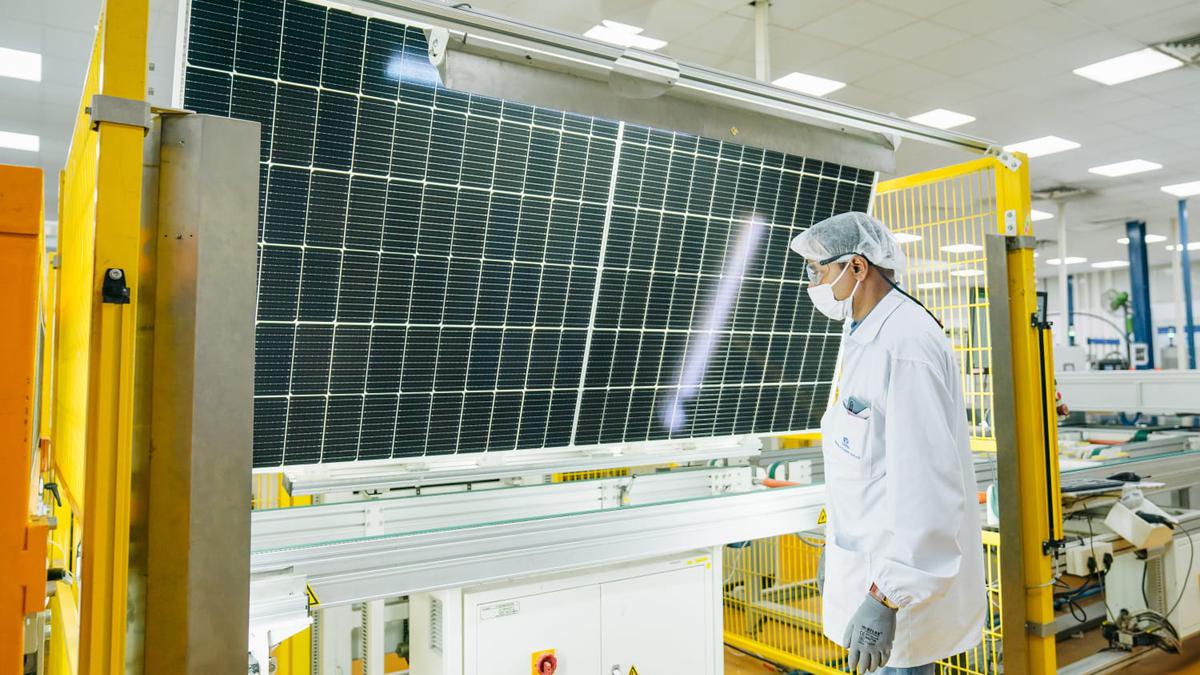
U.S. agency approves USD 425 million financing for Tata Power’s solar cell, module manufacturing plant in T.N.
The Hindu
DFC approves USD 425M financing for Tata Group's 4.3GW solar cell/module plant in Tirunelveli. Plant to create 2,000 jobs, majority of which will be women from local areas. Facility to integrate advanced tech, implement industry 4.0 standards. Financing to support India's renewable energy manufacturing, 500GW clean energy target by 2030. Tata Power committed to expanding clean/green energy capacity, targeting 70% by 2030.
The U.S. International Development Finance Corporation’s (DFC) board has approved a provision of up to USD 425 million in financing for Tata Group’s upcoming greenfield 4.3 GW solar cell and module manufacturing plant, in Tirunelveli.
The plant is being constructed by TP Solar Limited, a subsidiary of Tata Power Renewable Energy Limited (TPREL). TPREL is a subsidiary of Tata Power Company Limited
The plant’s first module production is expected by the end of the year, and the first cell production is expected in the first quarter of FY 24, according to a statement. The plant will integrate advanced technologies enabling the production of high wattage solar modules and cells with industry-leading efficiencies.
Additionally, the facility will implement industry 4.0 standards for smart manufacturing. The plant is expected to create over 2,000 employment opportunities directly or indirectly, with the majority of the employees being women employees from the local areas.
Pending a U.S. Congressional notification, this investment will support India’s ambitious programme to increase its renewable energy manufacturing capabilities, to support domestic solar capacity addition, as part of its global green energy transition, the statement said.
The financing support comes at a time when global leaders deliberated on energy transition and other critical sustainability challenges at the recently-concluded G20 Summit held in New Delhi. This financing support will contribute towards securing India’s commitment to achieving 500 GW of clean energy targets by 2030, the statement said.
“It shows the trust and belief DFC has in Tata Power’s ability to set up a state-of-the-art manufacturing supply line in the country. This will go a long way in supporting the renewable and clean energy transition in the country,” said Praveer Sinha, CEO & MD, Tata Power.

“Writing, in general, is a very solitary process,” says Yauvanika Chopra, Associate Director at The New India Foundation (NIF), which, earlier this year, announced the 12th edition of its NIF Book Fellowships for research and scholarship about Indian history after Independence. While authors, in general, are built for it, it can still get very lonely, says Chopra, pointing out that the fellowship’s community support is as valuable as the monetary benefits it offers. “There is a solid community of NIF fellows, trustees, language experts, jury members, all of whom are incredibly competent,” she says. “They really help make authors feel supported from manuscript to publication, so you never feel like you’re struggling through isolation.”

Several principals of government and private schools in Delhi on Tuesday said the Directorate of Education (DoE) circular from a day earlier, directing schools to conduct classes in ‘hybrid’ mode, had caused confusion regarding day-to-day operations as they did not know how many students would return to school from Wednesday and how would teachers instruct in two modes — online and in person — at once. The DoE circular on Monday had also stated that the option to “exercise online mode of education, wherever available, shall vest with the students and their guardians”. Several schoolteachers also expressed confusion regarding the DoE order. A government schoolteacher said he was unsure of how to cope with the resumption of physical classes, given that the order directing government offices to ensure that 50% of the employees work from home is still in place. On Monday, the Commission for Air Quality Management in the National Capital Region and Adjoining Areas (CAQM) had, on the orders of the Supreme Court, directed schools in Delhi-NCR to shift classes to the hybrid mode, following which the DoE had issued the circular. The court had urged the Centre’s pollution watchdog to consider restarting physical classes due to many students missing out on the mid-day meals and lacking the necessary means to attend classes online. The CAQM had, on November 20, asked schools in Delhi-NCR to shift to the online mode of teaching.









